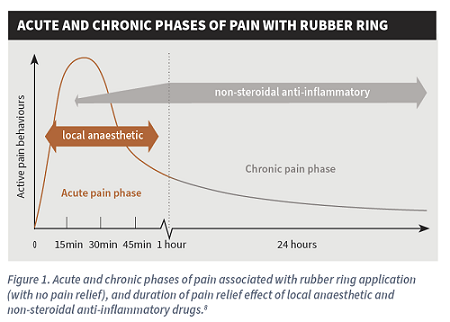Lamb tailing and castration
Tailing reduces faecal build-up around the lambs’ rear end. This helps prevent flystrike. Castrating lambs is undertaken to avoid having to separate ram and ewe lambs, as pregnancies can occur in ewe lambs as young as 4 months of age. Castrated rams are also easier to handle as they get older.
Some farmers are now assessing whether all lambs require tailing, and if castration could be limited to only those male lambs remaining on farm after weaning. Genetic solutions are also being explored, such as breeding for shorter tails.
Currently most NZ lambs undergo hot iron cautery for tailing, and rubber ring application for castration.
Pain relief options
Local anaesthetics and meloxicam are NZ registered options for use in lambs.

Local anaesthetics take effect within minutes and provide short-term pain relief for an hour or more. One or two injections may be sufficient for ring castration, and two injections or a 'ring block' best for tailing. Multiple injections can mean administering local anaesthetic is less practical for large numbers of lambs.
A topical product exists, but this is only suited to surgical wounds rather than cauterised wounds from hot iron tailing.
Non steriodal anti-inflammatory products (NSAID) such as Melovem 30 will take effect within 15-30 minutes, and provide longer-acting pain relief for up to 24 hours. Because the meloxicam is systemically administered and absorbed, this can provide pain relief for both tailing and castration.
Using both a local anaesthetic and Melovem together will provide better pain relief, but may not be practical in NZ farming systems.
Most NZ lambs undergo hot iron cautery for tailing and rubber ring application for castration (for male lambs), and a single injection of Melovem 30 will mitigate the pain from both procedures.
Melovem 30 provides potent long acting pain relief, and comes with an applicator for easy administration.
Benefits of pain relief
The benefits of using pain relief for husbandry procedures such as tailing and castration include improved animal wellbeing, leading to sheep farmers having peace of mind in doing the right thing. It also demonstrates best practice lamb care in New Zealand and will contribute to increase market access and final product premiums.
Veterinarians - refer Technical Bulletin N8 Pain relief in NZ Lambs and check out our Vet Newsletter article on improving lamb wellbeing
Sheep farmers - please discuss lamb pain relief options with your veterinarian.
Refer Melovem for sheep flyer for more information or the Melovem 30 product page
Melovem 30 is a NZ restricted veterinary medicine ACVM no. A11562 registered to AgriHealth NZ Ltd. Available only under a veterinary authorisation.
Lamb tailing and castration
Tailing reduces faecal build-up around the lambs’ rear end. This helps prevent flystrike. Castrating lambs is undertaken to avoid having to separate ram and ewe lambs, as pregnancies can occur in ewe lambs as young as 4 months of age. Castrated rams are also easier to handle as they get older.
Some farmers are now assessing whether all lambs require tailing, and if castration could be limited to only those male lambs remaining on farm after weaning. Genetic solutions are also being explored, such as breeding for shorter tails.
Currently most NZ lambs undergo hot iron cautery for tailing, and rubber ring application for castration.
Pain relief options
Local anaesthetics and meloxicam are NZ registered options for use in lambs.

Local anaesthetics take effect within minutes and provide short-term pain relief for an hour or more. One or two injections may be sufficient for ring castration, and two injections or a 'ring block' best for tailing. Multiple injections can mean administering local anaesthetic is less practical for large numbers of lambs.
A topical product exists, but this is only suited to surgical wounds rather than cauterised wounds from hot iron tailing.
Non steriodal anti-inflammatory products (NSAID) such as Melovem 30 will take effect within 15-30 minutes, and provide longer-acting pain relief for up to 24 hours. Because the meloxicam is systemically administered and absorbed, this can provide pain relief for both tailing and castration.
Using both a local anaesthetic and Melovem together will provide better pain relief, but may not be practical in NZ farming systems.
Most NZ lambs undergo hot iron cautery for tailing and rubber ring application for castration (for male lambs), and a single injection of Melovem 30 will mitigate the pain from both procedures.
Melovem 30 provides potent long acting pain relief, and comes with an applicator for easy administration.
Benefits of pain relief
The benefits of using pain relief for husbandry procedures such as tailing and castration include improved animal wellbeing, leading to sheep farmers having peace of mind in doing the right thing. It also demonstrates best practice lamb care in New Zealand and will contribute to increase market access and final product premiums.
Veterinarians - refer Technical Bulletin N8 Pain relief in NZ Lambs and check out our Vet Newsletter article on improving lamb wellbeing
Sheep farmers - please discuss lamb pain relief options with your veterinarian.
Refer Melovem for sheep flyer for more information or the Melovem 30 product page
Melovem 30 is a NZ restricted veterinary medicine ACVM no. A11562 registered to AgriHealth NZ Ltd. Available only under a veterinary authorisation.
